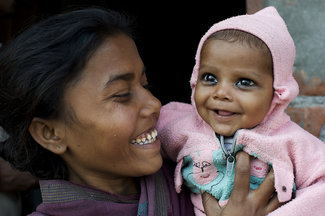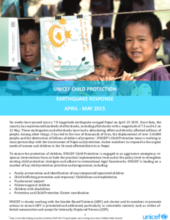

Displaying 601 - 610 of 751
This post from World Vision tells the story of one mother in Nepal who was approached by strangers after the recent earthquake asking to adopt her children. The story highlights the increased dangers faced by children and families, especially those most vulnerable, after a natural disaster.
In this blog post, Family for Every Child highlights how the earthquake could see a rise in institutional care and calls for anyone supporting the situation in Nepal to prioritise families, not orphanages in relief efforts.
In his blog post, Eric Hartman from Globalsl.org highlights the efforts of actors in Nepal to discourage post-quake volunteering with vulnerable children, and also gives some guidelines for prospective volunteers on how to choose responsibly when it comes to selecting a volunteer placement.
This document reviews UNICEF’s achievements in ensuring children’s protection in the 6 weeks following the devastating earthquakes in Nepal in 2015.
SOS Children’s Villages issued a statement, in response to the earthquake in Nepal, urging against the use of international adoption of children from Nepal as a means of responding to the disaster.
This article from Hindustan Times highlights the increased rates of, and vulnerability to, trafficking that accompany a natural disaster, such as the earthquake in Nepal.
This article, from Time, describes the efforts of the Israeli government to evacuate babies of Israeli parents - born to surrogate mothers in Nepal - in the aftermath of the recent earthquake.
In this opinion piece from the Guardian, Claire Bennett from Learning Service, who lives and works in Nepal, writes about volunteering in Nepal in response to the recent earthquake and the potential negative impacts involved.
This article, from the Australian Women’s Weekly, sheds light on the abuses of international surrogacy.
The Cabinet minister of women and child development (WCD) is dissatisfied with the progress made on the inquiry into the alleged child marriage racket being run at the Mahila Swikar Kendra orphanage in Baramati, India and has therefore ordered a high-level inquiry into these offenses, says the article.

